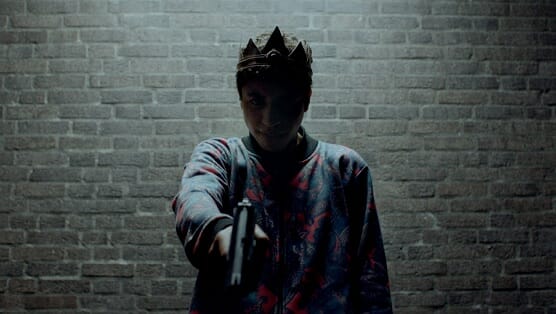
If you’ve seen the coming-of-age movies and crime flicks that influence Sam de Jong’s Prince, you can guess where it’s heading within its first 10 minutes. Teenage boys with too much free time and too many hormones, menacing older boys who haunt their inner city neighborhood, pulsing house scores, adolescent infatuation, misguided masculinity, material obsession, and the lingering threat of violence all weave through the film’s setup. Its more vivid elements may tempt viewers into lumping Prince in with Nicolas Winding Refn’s school of disaffected genre filmmaking. But de Jong’s work boasts a naked sentimentality that Refn’s roundly lacks, and for all of its stylistic flourishes, Prince ultimately reads as anti-Refn.
Besides: De Jong is Dutch and Prince has a Dutch national focus. Comparing him to Refn feels as obvious as it does lazy, particularly when traces of Scorsese, De Palma, Truffaut, and proto-Anderson are easily sniffed out of his aesthetic. Prince isn’t a movie about casual cool so much as it’s a movie about dismantling the slick facade of casual cool. Its protagonist, Ayoub (Ayoub Elasri), a young Dutch-Moroccan kid living in an Amsterdam housing project, feels the magnetic pull of macho gangster bullshit early on in the film’s slim duration—he and his friends are captivated by the coruscating allure of branding, rattling off designer names in envy as they stand in awe of a purple-coated Lamborghini that serves as a recurring symbol throughout the picture. Gucci. Marc Jacobs. Zanotti. Valentino.
The car belongs to Kalpa (Dutch rapper and fashion designer Freddy Tratlehner), the local ruling hoodlum and a dedicated nutjob. Kalpa is the living embodiment of criminal ostentatiousness, and, of course, Ayoub wants a piece of what he has; he stares at his reflection in the Lamborghini’s window, literally seeing himself in the driver’s seat. (You may take this image as a tongue-in-cheek Refn nod if you like.) But Ayoub wants other things that aren’t his, too, whether it’s acknowledgment from his friend Franky’s (Jorik Scholten) older brother Ronnie (Peter Douma), or the affections of Laura (Sigrid ten Napel), who’s going steady with Ronnie’s right-hand man Vince (Vincent van De Waal). She’s the kind of girl who can smile at you with her laugh and laugh at you with her smile.
Ayoub sees all he desires stretched out before him, but life knocks it out of reach. There isn’t a single plot-driving wrong in Prince that demands righting. Rather, there are handfuls of them. Ronnie disdains Ayoub, as well as his pals Achraf (Achraf Meziani) and Oussama (Oussama Addi), piling racist invective on them at every opportunity; Laura, at least to begin with, spurns Ayoub’s attempts at courtship; and everybody, even Ayoub’s mom (Elsie de Brauw) and half sister Demi (Olivia Lonsdale), reminds the lad his father (Chaib Massaoudi) is just a worthless junkie. Reinforced social prejudice and disenfranchisement are the things that Ayoub is made of. If Kalpa’s lifestyle didn’t look attractive on its own merits, de Jong tells us, then Ayoub’s universal disappointments certainly push him right toward Kalpa’s doorstep.
Prince has electric vim but it also has humanity. De Jong sees his characters. He cares about Ayoub. He cares about Ayoub’s circumstances, his pain, and that he chooses to act out that pain instead of processing it. The film remains deeply sympathetic throughout, not just to Ayoub but to all of de Jong’s cast, save for Kalpa, who represents a strain of gaudy and reckless self-indulgence that the film rails against. Prince could use another 15 minutes to flesh out its narrative and its relationships—what movie couldn’t?—but it uses its time wisely and with an enormous efficacy only matched in size by the film’s heart. Even if de Jong and Refn were countrymen, they simply wouldn’t compare.
Director: Sam de Jong
Writer: Sam de Jong
Starring: Ayoub Elasri, Freddy Tratlehner, Sigrid ten Napel, Jorik Scholten, Elsie de Brauw, Olivia Lonsdale, Chaib Massaoudi, Achraf Meziani
Release Date: August 14, 2015
Boston-based critic Andy Crump has been writing online about film since 2009, and has been scribbling for Paste Magazine since 2013. He also contributes to Screen Rant, Movie Mezzanine, and Badass Digest. You can follow him on Twitter. He is composed of roughly 65 percent Vermont craft brews.